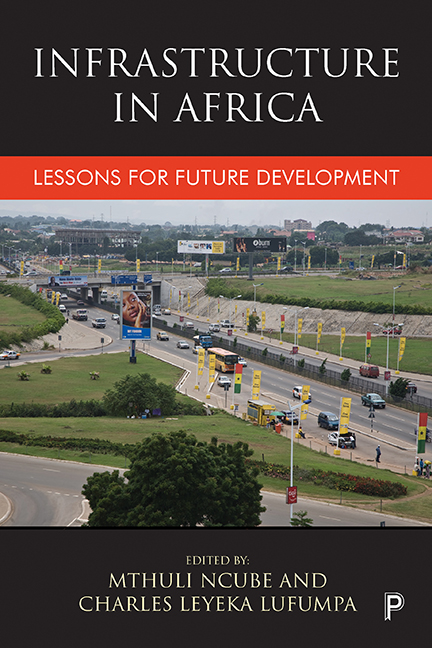Book contents
- Frontmatter
- Contents
- List of figures
- List of tables
- List of boxes
- Notes on contributors
- Acknowledgements
- Foreword
- Introduction: Infrastructure in African development
- Part 1 Spatial and demographic contexts
- Part 2 Sector-specific issues
- Part 3 Regional issues
- Part 4 Financing issues
- Part 5 Concluding remarks
- Index
six - Africa’s prospects for infrastructure development and regional integration: energy sector
Published online by Cambridge University Press: 05 April 2022
- Frontmatter
- Contents
- List of figures
- List of tables
- List of boxes
- Notes on contributors
- Acknowledgements
- Foreword
- Introduction: Infrastructure in African development
- Part 1 Spatial and demographic contexts
- Part 2 Sector-specific issues
- Part 3 Regional issues
- Part 4 Financing issues
- Part 5 Concluding remarks
- Index
Summary
Introduction
The African energy sector lags far behind those of other developing regions. Household access to electricity is extremely low (only 29% of Africans in Sub-Saharan Africa have access); electricity supply is unreliable (African manufacturers experience power outages, on average, 56 days per year); and power is expensive (African power tariffs are significantly higher than those in other developing regions). In addition, most people in Sub-Saharan Africa rely on traditional fuel sources such as paraffin and wood for heating and cooking. Regional oil and gas infrastructure is limited, because there is little interconnectivity between national transmission and transport networks. The result is a small number of regional oil and gas pipelines (concentrated in North Africa) and many isolated national pipeline networks. The lack of a sufficient and reliable supply of energy not only directly affects the quality of life of Africans, but also hinders economic growth, employment, and ultimately livelihoods.
Interdependence between economic growth and energy demand
Economic growth and energy demand are interdependent: Africa requires access to energy to achieve economic growth, and greater economic growth increases energy demand, largely from industrial activities. Sufficient energy infrastructure is required to support growing African economies and to provide energy access to enable poorer African nations to grow. Improving the underdeveloped energy sector has often been identified as a key to achieving greater economic growth. Currently, African businesses lie idle because power supplies are unreliable, and economic activity stagnates. In addition, the lack of adequate infrastructure hinders trade and slows economic growth: African markets are inaccessible to trading partners throughout the globe, thereby reducing the world's trade with the continent. Furthermore, trade between neighboring nations is limited.
Uneven distribution of energy resources in Africa
Africa consists of many small, isolated economies with an uneven distribution of energy resources. Windfall profits are earned by North African countries such as Libya and Algeria that capitalize on their oil and gas endowments; countries such as the Democratic Republic of the Congo (DRC) and Ethiopia struggle to provide energy access for basic human needs. Small national energy markets also mean that it is difficult to achieve economies of scale, which makes infrastructure investments unattractive, even when energy supplies are abundant.
- Type
- Chapter
- Information
- Infrastructure in AfricaLessons for Future Development, pp. 185 - 256Publisher: Bristol University PressPrint publication year: 2017



